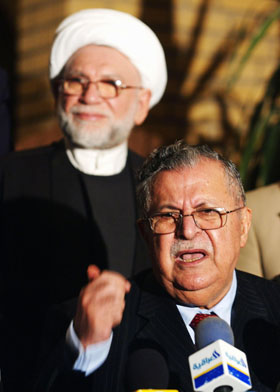|
Iraqi president fails to order new parliament into session
(AP)
Updated: 2006-03-07 09:10
Iraq's president failed in a bid to order parliament into session by March
12, further delaying formation of a government and raising questions whether the
political process can withstand the unrelenting violence or disintegrate into
civil war.

Iraqi President Jalal
Talabani speaks during a news conference after a meeting with members from
the United Iraqi Alliance (UIA), a coalition of Shiite political and
religious parties and figures, at Talabani residence in Baghdad March 6,
2006.
| The deadlock came Monday as snipers assassinated Maj.
Gen. Mibder Hatim al-Dulaimi, the Sunni Arab in charge of Iraqi forces
protecting the capital. A torrent of bombings and shootings killed 25 more
Iraqis on Monday, ending a relative lull in violence. Officials also found four
bodies.
At the heart of the dispute is a controversy over the second-term candidacy
of the Shiite prime minister, Ibrahim al-Jaafari, whose most powerful supporter
is the anti-American cleric Muqtada al-Sadr.
The Sunni Arab minority blames al-Jaafari for failing to control the Shiite
militiamen who attacked Sunni mosques and clerics after the February 22 shrine
bombing in Samarra. Kurds are angry because they believe al-Jaafari is holding
up resolution of their claims to control the oil-rich city of Kirkuk.
In a bid to force a showdown in the dispute, President Jalal Talabani, a
Kurd, announced he would order parliament to convene Sunday for the first time
since the elections in December and the ratification of the results on February
12.
Such a meeting would have started a 60-day countdown for the legislators to
elect a president, approve al-Jaafari's nomination as prime minister and sign
off on his Cabinet.
Talabani was mistakenly counting on the signature of Vice President Adil
Abdul-Mahdi, a Shiite, who lost his own bid for the prime minister's nomination
by one vote to al-Jaafari. Talabani had in hand a power of attorney from the
other vice president, Ghazi al-Yawer, a Sunni, who was out of the country.
The Shiite bloc closed ranks and Abdul-Mahdi declined to sign, at least for
now. In an emergency meeting with Talabani on Monday, seven Shiite leaders
rejected the president's demand for them to abandon al-Jaafari's nomination.
It remained unclear when parliament might convene, despite the constitutional
directive that set Sunday as the deadline. Nor was it clear how the disagreement
over al-Jaafari might be settled.
The president first issued the challenge Wednesday in concert with Sunni Arab
and some secular politicians.
"We want a prime minister who can gather all the political blocs around him,
so that the government would be one of national unity," Talabani told reporters
in Baghdad around midday Monday.
Leaders of all Iraq's major political factions scheduled a meeting Tuesday
evening in an attempt to untangle the religious and sectarian differences behind
the crisis, deeply compounded by continuing violence.
The attacks underscore the dangerous leadership vacuum and fresh political
infighting that have torn apart many tenuous political bonds among the country's
many religious and ethnic factions.
There also were increasing signs of a split in the Shiite factions, even
though they managed to come together Monday night to reject the move to dump
al-Jaafari.
Nevertheless, al-Sadr, the firebrand cleric whose backing had insured
al-Jaafari's nomination at the Shiite caucus last month, predicted a "quick
solution" on approving a government.
There were reports that al-Sadr had threatened to order parliamentarians
loyal to him to boycott a Sunday session if Abdul-Mahdi, the Shiite vice
president, had signed the Talabani order to convene the legislature.
"All obstacles to forming a national unity government soon will be resolved,"
al-Sadr said after meeting with Deputy Prime Minister and acting Oil Minister
Ahmad Chalabi in the Shiite holy city of Najaf.
Many of Monday's attacks targeted the country's Shiite-led security forces,
accused by Sunni Arabs of repeated abuses against them under the cover of
fighting the Sunni-driven insurgency. The government denies the accusations.
In Baqouba, a car bomb targeting an Iraqi police patrol exploded near the
mayor's office and a market, killing six people and wounding 23, including four
patrolmen, police said. Piles of charred, twisted wreckage and pools of blood
marked the site.
Elsewhere, two bombs went off in Baghdad's notorious southern Dora
neighborhood. One targeted an Interior Ministry patrol, killing six Iraqis. A
second exploded as a U.S. patrol was passing, wounding five policemen who were
guarding a bank and two civilians.
A US soldier was also killed Sunday in insurgency-plagued western Anbar
province, the military announced, bringing to 2,300 the number of U.S. service
members who have died in Iraq since the war began three years ago, according to
an Associated Press count.
Al-Dulaimi, the Sunni in charge of patrolling Baghdad with his 6th army
division, was killed when gunmen fired at his convoy.
The US commander in Iraq, Gen. George W. Casey, sent condolences to "his
family, tribe, and the Iraqi Army during this tragic loss."
"This tragic incident will neither impede the 6th Iraqi Army Division from
continuing its mission of securing Baghdad nor derail the formation of the
government of Iraq," Casey said in a statement.
|